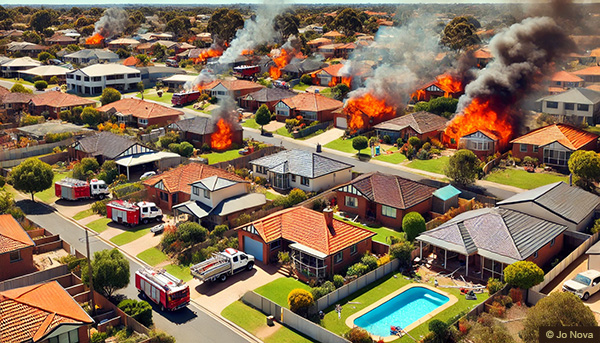
Battery bombs in the suburbs?
By Jo Nova
You think exploding pagers was a wicked trick….
Hypothetically, suppose you were distracted while you tried to change tropospheric jet streams, and accidentally gave away your national manufacturing to a foreign adversary. Next thing you know, you’re buying the batteries they make, and installing them in essential grid infrastructure and thousands of homes. You’re patting yourself on the back for getting a cheap deal (never mind the slaves) and it all seems dandy until one sunny day, a leader who was cheesed off with a trade deal, quietly switched off the “overcharge protection” on all of them remotely.
At that point, millions of solar panels are pumping excess electricity into batteries that have no safety cut off. A few houses start to go off like popcorn, and an hour later we’re all living at the Western Front.
Brian Craighead – chief executive of Energy Renaissance, has come to warn us — it’s a hidden threat to national security. He says Australia has already installed 220,000 batteries that were made in potentially unfriendly places, and each home battery has roughly 7,500 times as much energy as a pager. As he remarks: “overcharge is when all hell breaks loose”.
Now, he happens to sell secure battery management systems — so he has an interest in scaring the socks off Energy Ministers and hyping things up, but ask yourself this: would Anthony Albanese have seen this coming?
To ask the question is to know we’re in trouble.
Energy entrepreneur says Australia’s solar and battery boom is a ‘clear and present danger’
By Jared Lynch, The Australian
“When everyone talks about battery safety, we tend to think about the chemical stuff – these fires that you see on videos of Tesla cars going up. But those are relatively unusual. The key thing to focus on is battery software … that’s what protects them from overcharging.
“Let’s say you were a bad actor from a bad country, here’s what you could do, and this would be horribly easy. For example, you could say on January 7, 2025, I’m going to turn off the overcharge on 200,000 batteries installed in homes in Australia. Nothing is going to happen until then.”
It would make a great movie, but a lousy life:
“A co-ordinated attack exploiting these vulnerabilities could lead to widespread fires, explosions, and a crippling of our energy infrastructure. The risk extends beyond individual homes. Large, imported grid-connected batteries are becoming integral to Australia’s national energy grid. These massive storage systems, often managed by foreign-developed software, could be susceptible to cyber-attacks or sabotage, posing a threat to national security and public safety.
“There’s a clear and present danger.”
As Craighead says (so colorfully) — it’s like pink-batts on steroids. (A program here in Australia where a Big Government-made bubble in home insulation killed 3 poorly trained people and set fire to 200 homes.)
In the end, after the bombs and the blackouts, the hit to the GDP and the death toll — it will all be deemed a dreadful accident, due to a fault in a minor part, and a hot day caused by climate change. Everyone will know what happened, but no one will want to risk the lobster-wine-coal-barley-beer-students deal, and besides the nation needs to order new fridges and solar panels.
Unless, of course the home-battery-bombs were a decoy in a larger hostile plan, in which case we’ll have bigger things to worry about.
Speaking of which:
The US banned the Pentagon from buying batteries from six Chinese manufacturers earlier this year.